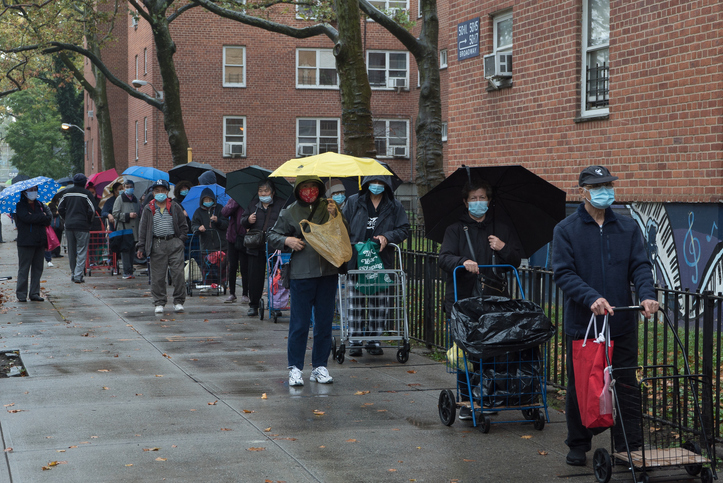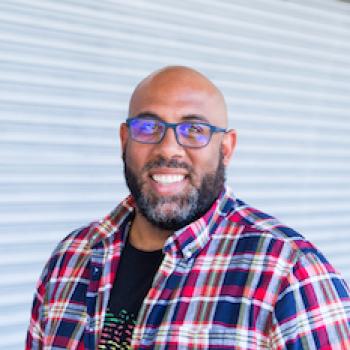On episode three of Raci$m Is Profitable, Solana Rice and Jeremie Greer talk about personal responsibility — the idea that if your money’s not right, it’s because you’re doing something wrong. They remind us that this toxic assumption is behind countless political and policy decisions, with real consequences for Black and brown lives. They’re joined by former Stockton, California, Mayor Michael Tubbs, the founder of the Mayors for Guaranteed Income and Ending Poverty in California, otherwise known as EPIC. You can read an edited transcript below or check out the full episode here.
Solana Rice: Tell us about when you first confronted this personal responsibility narrative. How did it land for you?
Michael Tubbs: Well, what’s funny is that I used to be a big adherent to the ideology. Growing up poor in Stockton, so much of what my mom taught, my grandma and aunt taught — but also church and other people I looked up to — was this idea that you have to work twice as hard. You have to pull yourself up by your bootstraps. And looking back at it, I realized that part of that was just survival — like, as a young person, what agency do I have against a system? But now I realize it’s just an incomplete narrative. We wouldn’t have to overemphasize agency if we got the structures right.
Jeremie Greer: As Mayor of Stockton, you stepped out there and really pushed through this narrative in offering cash to people that need it. Where did this conversation around deservedness show up in the conversations you had with people around that policy, whether it was the folks you needed to get to pass it or the folks in the community you needed to bring along?
Rice: And the funders.
Tubbs: People are like, “Oh, his dad’s in jail, his mom had him young. He went to Stanford. Now he’s mayor.” I think a lot of people, particularly more conservative people in my community, expected me to weaponize my identity against my folks and be like, “Well, look, I did it; you guys need to do it.” And I made a very conscious effort to use my story in a way that speaks to all the policy failures along the way.
People will always be upset when you’re just giving people things, particularly with basic income because it’s also racialized. Stockton is the most diverse city, but the city is only ten percent Black; it is 30-35 percent white, 35 percent Latino, 20 percent Asian. And diversity doesn’t mean racial equity. And it doesn’t mean racial tolerance. There’s a real history and legacy of racism in this city.
Guaranteed income became, Michael Tubbs is giving money to Black people or Michael Tubbs is giving money to people who don’t want to work or Michael Tubbs is bribing people to vote for him. And this is before we gave out a single dollar, before we even had selection criteria. People already had in their mind that, somehow, those who deserve to be poor, those who deserve to struggle, were going to be given something. And what was the craziest thing to me — I still don’t understand this piece — is that it wasn’t even government money. It was philanthropic money. And then people were mad because we could only help 125 people — and they weren’t getting it.
Rice: How did that narrative play out?
Tubbs: The first day we announced we’re doing guaranteed income, I was 27 years old. We were at this conference and Joe Biden, then Vice President, gave a speech about coal workers. And they asked him about my basic income. And he said, “We’re not sending people checks; people want the dignity of work.” And the first question I received as a 27 year old was like, “VP Biden said that this takes away dignity. How do you respond to that?” From that moment on, we started talking about the dignity of people before work. The fight was a narrative one. We want everyone to have a guaranteed income because everyone, regardless of the choices they make, deserves a floor by virtue of being human.
Rice: Too many of us are holding these narratives. But we know that they literally can’t be true, because we’ve seen the money come, we’ve seen people’s lives give better. And we should be telling all of our electeds that this is what we want, need, and deserve.
Tubbs: It’s a corrosive myth that leads to a lack of empathy and a lack of shared understanding that maybe the person next to me in the same city with the same income might have the same problems as me; maybe I’m not so unique. Individualism makes it so that we’re so inwardly focused.
Rice: Individualism is very seductive, right? Because it gives me agency; I feel like I can do something. But it also does not promote empathy. It does not enable me to see myself in someone else.


